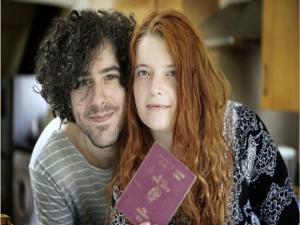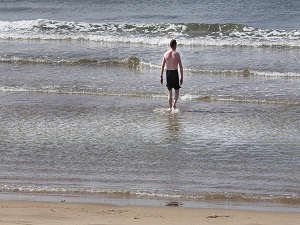
By David Young, PA and Q Radio News
The Home Office has won its appeal against an immigration tribunal ruling which found that people born in Northern Ireland are not automatically British.
The woman at the centre of the case, Emma DeSouza, from Magherafelt, Co Londonderry, applied for a residence card for her US-born husband Jake. She made the application identifying herself as an Irish citizen.
The Home Office rejected the application on the grounds that it considered Ms DeSouza a British citizen. Officials told her she should could either reapply identifying herself as British, or renounce her UK citizenship and reapply as an Irish citizen.
The Co. Derry woman argued that she never considered herself British, so how could she renounce citizenship she never had.
Ms DeSouza took a legal challenge against the Home Office and won, with a judge at a First Tier Immigration Tribunal ruling that she was an "Irish national only who has only ever been such".
The Home Office appealed against that decision at an Upper Tribunal hearing earlier this year.
Ms DeSouza revealed the outcome of the appeal at a press conference in Belfast.
"We have not received a decision in our favour, the decision has gone in the favour of the Secretary of State," she said.
"We have unfortunately lost. We are both deeply disappointed by this decision today."
She insisted her legal battle would go on.
"After four years it's safe to say we won't be lying down anytime soon," she said.
🎥 Emma De Souza says she is disappointed after losing a challenge against the Home Office and plans appeal it. She says today’s ruling undermines the Good Friday Agreement and the right people living in NI have to identify as Irish, British or both. @EmmandJDeSouza pic.twitter.com/2PkXGFnUuM
— Q Radio News (@qnewsdesk) October 14, 2019
Ms DeSouza had insisted the Home Office position ran contrary to the 1998 Good Friday peace agreement, which gave anyone from Northern Ireland the right to identify as British, Irish or both.
Government lawyers argued that the British Nationality Act 1981 was the relevant legislation - not the Good Friday accord.
They highlighted that the provisions on citizenship outlined in the agreement, which was struck between the Stormont parties and the UK and Irish Governments, had not been incorporated into the corresponding piece of domestic legislation linked to the peace treaty, the 1998 Northern Ireland Act.
The Government said the British Nationality Act ruled that anyone born in Northern Ireland was automatically British, until such time as they renounce that citizenship.
Ms DeSouza accused the UK Government of failing to implement the provisions of Good Friday Agreement into UK domestic law.
She said her case will have implications for EU citizens post-Brexit.
🎥 Robert Croskery @MSMLAWBELFAST, Emma and Jake De Souza’s solicitor says the case has raised some unique and untested legal issues. He says they will continue to support the couple as they plan to appeal today’s ruling. pic.twitter.com/dqNcQPrSlB
— Q Radio News (@qnewsdesk) October 14, 2019
Meanwhile, Ms DeSouza also received the backing of politicians who found that today's ruling undermined the Good Friday Agreement.
They have called for intervention from the British and Irish governments to ensure people living in Northern Ireland have the right to identify as Irish, British or both.
🎥 Ulster Unionist @mikenesbittni says today’s ruling in @EmmandJDeSouza case “demands a political debate” and a political resolution. Alliance @StephenFarryMLA says there are challenges for the British and Irish governments to ensure anomalies around identity are “ironed out”. pic.twitter.com/zuBieswKIp
— Q Radio News (@qnewsdesk) October 14, 2019
🎥 Following the ruling of @EmmandJDeSouza case, @NiallSF says there needs to be intervention from both British and Irish governments to ensure people living in NI who identify as Irish or both have their rights upheld under the Good Friday Agreement. pic.twitter.com/L7Mn4F3l6k
— Q Radio News (@qnewsdesk) October 14, 2019


 Detectives given more time to question man over murder of pensioner
Detectives given more time to question man over murder of pensioner
 Bathing restrictions at Benone Beach lifted as algae ‘no longer a risk’
Bathing restrictions at Benone Beach lifted as algae ‘no longer a risk’
 Six SEN pupils without places as schools return across Northern Ireland
Six SEN pupils without places as schools return across Northern Ireland
 Investigation continues into death of Tipperary teenager at Belfast festival
Investigation continues into death of Tipperary teenager at Belfast festival
 New search taking place in Co Monaghan bog for IRA victim Columba McVeigh
New search taking place in Co Monaghan bog for IRA victim Columba McVeigh